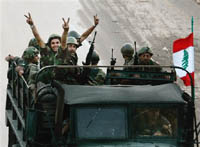Europe is not eager to send its soldiers to Lebanon
Four days into a ceasefire between Israel and Hezbollah in Lebanon, there was still no firm date for a deployment of an enhanced international force that is supposed to expand to 15,000 troops and join an equal number of Lebanese soldiers.

The United Nations got pledges on Thursday of 3,500 troops for the force, with Bangladesh making the largest offer of up to 2,000 troops. But France offered just 400, and Germany - uneasy given its Nazi past of any possible military confrontation with Israeli soldiers - said it wouldn't send any.
France was expected to lead the UN force, and its announcement of such a small number focused attention on its demands for a more explicit mandate, including when to use firepower, and could affect contributions by other countries.
Even though the Israel withdrawal and handover to UN forces has gone well thus far, some potential contributors are believed to be concerned about avoiding confrontation with Hezbollah or being caught in the middle of a future conflict.
The UN ceasefire resolution called for the force to keep the peace and disarm Hezbollah fighters south of the Litani River. However, the Lebanese government adopted a mandate on Wednesday that requires confiscation of Hezbollah arms only if carried in public, The Guardian reports.
Deputy UN Secretary-General, Mark Malloch Brown, said on Thursday that the meeting among countries that could send troops to a UN peacekeeping force in Lebanon has made a reasonable start.
"We are. in business, but a lot of work needs to be done in the coming days to meet the deadline that we insisted on in this meeting, which is that we have 3,500 additional troops deployed within 10 days from now," he told reporters after the meeting.
In an opening address, Brown said the situation in Lebanon is "tenuous" though the cessation of hostilities is still holding. "We must all act with great urgency to construct a lasting ceasefire from the current cessation of fighting."
He said that as the Security Council resolution recognizes, there will be a strong, robust UN force, equipped and authorized to take "all necessary action" in its key tasks.
The tasks include supporting the Lebanese army in humanitarian efforts, preventing the resumption of hostilities, and in establishing an area free of any armed personnel between the Blue Line, the UN-demarcated border, and the Litani River, some 20 km from the Israeli border, People’s Daily Online says.
Deployments by Italy, Spain and Belgium, are key because they can move their forces into Lebanon quickly to meet the 15-day U.N. deadline an advance contingent of 3,500 troops.
All three nations are studying draft rules of engagement presented to dozens of ambassadors at a meeting chaired by Mark Malloch Brown, the deputy U.N. secretary-general.
A U.N. Security Council resolution adopted on Friday called for a truce and a peacekeeping force to help the Lebanese army supervise the pull-out of Israelis after 34 days of fighting between Israel and Hezbollah guerrillas.
The resolution authorised up to 13,000 well-armed troops to augment the 2,000-member U.N. force now in Lebanon, known as UNIFIL. Most fighting stopped on Monday, according to Reuters.
Source: agencies
Prepared by Alexander Timoshik
Pravda.ru
Subscribe to Pravda.Ru Telegram channel, Facebook, RSS!





